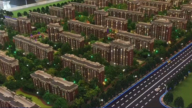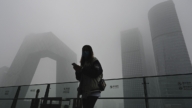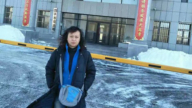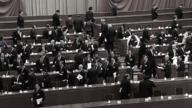【新唐人2012年12月22日讯】继“反腐蓝皮书”被批评为“不具备真实性和权威性”之后,“中国社会科学院”再次公布《公共服务蓝皮书(2012)》。这次的报告提出,中国民众有4成深夜不敢外出,但是市民安全感排名,西藏拉萨位居首位,观众朋友﹗你相信吗﹖
“中国社会科学院”等单位调查并公布的《公共服务蓝皮书(2012)》披露,中国38个城市的市民,有39.91%的人表示﹕深夜不敢外出,38.69%的人表示﹕如果长时间离家,会担心家里财产安全。
导致安全感不足的原因有哪些呢﹖蓝皮书的调查认为,社会深度变革和结构转型,导致不确定性增加,风险增多。利益分配深度调整,引发两极分化、分配不公、利益冲突和社会心理失衡,部分收入较低的人群基于对分配不公的敌意,恣意释放这种敌意,引发治安事件增多。
不过,“深圳当代社会观察研究所所长”刘开明认为,中国治安不好的地方,多数是因为老百姓的工作无着、生存困难等深沉的原因造成的。
深圳当代社会观察研究所所长 刘开明﹕“确实社会治安非常的不好,表面的原因,抢劫、偷盗、偷窃,这种现象非常的多,那深层的原因,实际上是社会的贫富不公,贫富差距越来越大,社会不公平的问题越来越多,同时,官场的腐败日益严重,导致很多中下层的,特别是底层的民众生活无着,经济困难,才会出现那么多治安事件。”
上海杨姓市民认为,部分外来人口造成的治安问题也不能排除,但是政府的管理经费是否运用妥善﹖也值得探讨。
上海市民 杨先生﹕“还有就是社会的管制问题,政府花了钱,花在什么地方﹖不是在加强老百姓的安全感方面,可能投入的更多的是其他方面,譬如说,监控一些民主人士,不是把钱用在老百姓希望你用的地方,这也是重要方面。”
南京陈女士也向《新唐人》谈了她的亲身感受。
南京市民 陈女士﹕“一般像小偷或干嘛的,偷完了抓来好像没犯太大的…觉得法规还是不是那个…丢了认倒霉了,你去报案也没用,我们也都报过案,结果抓来没两天就放出来了。”
蓝皮书披露,“市民安全感”排名前十名的城市是拉萨、上海、厦门、宁波、杭州、南京、长春、重庆、天津和大连。北京排在第十七名。
南京市民 陈女士﹕“所有下岗的还有一些失业的,确实没有人关心他们,因为现在关注都是什么事业单位的啦﹗还是公务员。就是好大一批这些人没办法生存,好多冤枉的事情,没办法﹗”
刘开明还表示,那么高的维稳经费,和公安的力量,实际上只解决维稳和防堵的问题,不是从根本上来解决老百姓的生活问题、或老百姓向上发展的空间问题、以及社会不公平的问题。
刘开明﹕“如果这个问题不能解决,那么再多的维稳费都没办法来消除社会的不公,来弥补、缩小贫富的差距,来疏通社会底层民众上升的通道,这样的话,就会有各种各样的治安事件、抢劫事件就会发生,那么老百姓的安全问题就不能得到改善。”
对于西藏的拉萨作为2012年中国“市民安全感城市”排名第一,也有人提出怀疑。由于中共政府长期对藏区实施高压政策,不但向藏区派驻有大量军警,还对当地进行军事管制。
采访/朱智善 编辑/周平 后制/孙宁
Deeper Reasons Behind China’s Increasing Public Insecurity
The newly released China’s Anti-Corruption Blue Book
has been criticized for “lacking authenticity and authority”.
The Chinese Academy of Social Sciences just released
another Blue Book on China’s Public Service (2012).
This annual report stated that nearly 40%
of Chinese citizens dare not go outside late at night.
Lhasa also tops the list as China’s safest city.
The Blue Book of China’s Public Service (2012)
reveals that 39.91% of residents in China’s
39 cities dare not go outside late at night.
38.69% of citizens say they would worry about home
burglary if they were on long-term out-of-town travel.
What causes have led to this public insecurity?
The Blue Book survey states the following reasons.
Social structural transformation has
caused increased uncertainty and risk.
Distribution of wealth policies have triggered
rich-poor polarization, unfair wealth distribution,
conflicts between interest groups,
and psychological imbalance.
Partial low-income groups’ hostile actions
have created increasing criminal incidents.
Liu Kaiming, director of a Shenzhen-based civil
think tank, says that primary reasons behind
a disorderly situation in China are due to local
unemployment, and people’s life of hardship.
Liu Kaiming (Director, Institute of Contemporary
Observation): “It’s true that social order is very bad.
The commonly overt reasons are robbery and theft.
But deeper reasons are income inequality,
widening rich-poor gap, increased social injustice issues, and growing officials’ corruption.
As a result, the middle and lower classes,
especially the grassroots, are living in hardship.
That’s why there occurred so many public security cases.”
Shanghai resident Mr. Yang thinks that some non-native
migrant workers contributed to criminal incidents.
Another issue worth considering is how the government
spent money for public administration, he says.
Mr. Yang: “One more reason is official administration.
How did the government spend this money?
It wasn’t used to improve the public sense
of security, but more so, it was used for other things.
For example, on surveillance of some pro-democracy
activists, rather than for the public interests.”
Ms. Chen from Nanjing reveals her personal experiences.
Ms. Chen: “Usually, when finding my things
stolen, I would think I simply had bad luck.
It’s useless to report it to the police.
We did report our case, but the thief
was soon released from custody.”
In the Blue Book, Lhasa tops the
list of safe Chinese cities of 2012.
It is followed by Shanghai, Xiamen, Ningbo,
Hangzhou, Nanjing, Changchun, Chongqing,
Tianjin and Dalian. Beijing is ranked 17th.
Ms. Chen: “No one pays heed
to the jobless, that’s the situation.
Now the focus is on public sector, civil service jobs.
In reality, a great number of these unemployed
people have no way to make a living.
There’re so many injustices happening, we’re just helpless!”
Liu Kaiming adds that tremendous money has been used
on maintaining stability and on public security forces.
Yet, no money is spent on helping
solve problems for ordinary people.
No creating space for the unprivileged masses
to move up, and to deal with society injustices.
Liu Kaiming: “If this problem isn’t solved, no amount
of maintaining stability can help eliminate social injustice.
Nor can it reduce the rich-poor gap, nor
create upward channels for the grass-roots.
As a result, criminal incidents in varied forms
would occur, as do local public safety concerns.”
Lhasa’s Number 1 ranking has reportedly been questioned.
Over the decades, Tibet has been put under
the CCP’s tightening control, where there has been stationed a large number of troops and police.




























